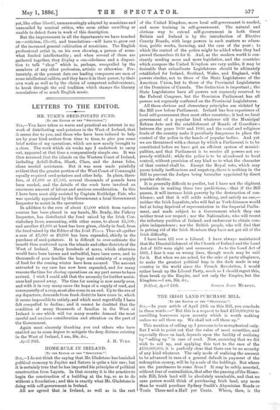HOME-RULE IN IRELAND.
[To THE EDITOR OF THE " SPECTAT011.1
S Ilt,—I do not think the saying that Mr. Gladstone has banished ,political economy to Jupiter and Saturn is quite a fair one ; but it is certainly true that he has imported his principles of political -construction from Lopata. In that country it is the practice to begin the construction of a building at the top, so as to do without a foundation ; and this is exactly what Mr. Gladstone is doing with self-government in Ireland.
All are agreed that in Ireland, as well as in the rest of the United Kingdom, more local self-government is needed, and more training in self-government. The natural and obvious way to extend self-government in both Great Britain and Ireland is by the introduction of Elective County Boards, with large powers in such matters as educa- tion, public works, licensing, and the care of the poor ; to which the control of the police might be added when they had proved themselves fit for it. And, as the modern world is con- stantly needing more and more legislation, and the countries which compose the United Kingdom are very unlike, it may be desirable that subordinate Legislatures should be ultimately established for Ireland, Scotland, Wales, and England, with powers similar, not to those of the State Legislatures of the American Union, but to those of the Provincial Legislatures of the Dominion of Canada. The distinction is important ; the State Legislatures have all powers not expressly reserved to the Federal Congress, but the Dominion Parliament has all powers not expressly conferred on the Provincial Legislatures.
All these obvious and elementary principles are violated by the Bill now before Parliament. Ireland has less experience of local self-government than most other countries ; it had no local government of a popular kind whatever till the Municipal Reform Acts and the establishment of Boards of Guardians, between the years 1830 and 1840, and the social and religious feuds of the country make it peculiarly dangerous to place the control of the police in the hands of popular bodies. And yet we are threatened with a change by which a Parliament is to be constituted before we have got an efficient system of munici- palities, and that Parliament is to receive all powers not ex- pressly withheld ; while the police is to be abandoned to local control, without provision of any kind as to what the character of that control shall be. Except the Royal veto, which may prove totally inefficacious and nugatory, there is nothing in the Bill to prevent the Judges being hereafter appointed by direct popular election.
It is generally difficult to predict, but I have not the slightest hesitation in making these two predictions,—that if the Bill passes, it will increase Irish poverty by the destruction of con- fidence; and that it will settle nothing, and satisfy no one,— neither the Irish Loyalists, who will feel as Yorkshiremen would feel at being deprived of representation in the Imperial Parlia- ment, and made subject to a Government which they can neither trust nor respect ; nor the Nationalists, who will resent the tributary position of Ireland, and endeavour to obtain com- plete independence ; nor the British people, who will find that in getting rid of the Irish Members they have not got rid of the Irish difficulty.
I have been till now a Liberal. I have always maintained that the Disestablishment of the Church of Ireland and the Land Act of 1870 were right and necessary. As to the Land Act of 1881, I fear it was on wrong lines, though much may be said for it. But when we are asked, for the sake of party allegiance, to make the greatest political leap in the dark made in any country in the world since the French Revolution, I would rather break up the Liberal Party, much as I should regret this, than break up the Empire, and not only the Empire, but the Kingdom.—I am, Sir, &c.,




































 Previous page
Previous page